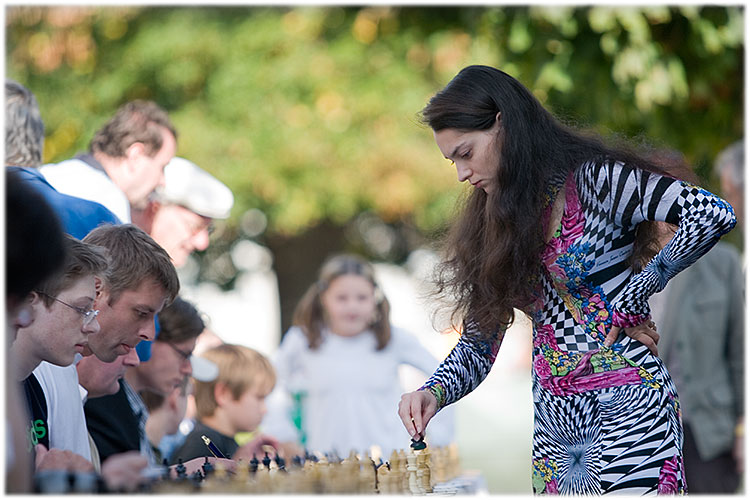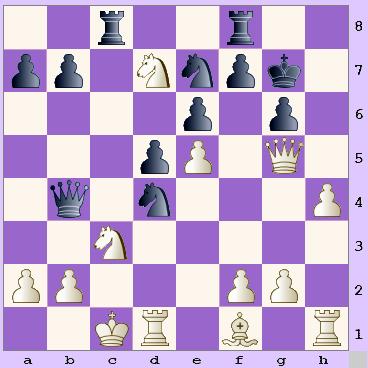
Hello everyone!
I am preparing to fly to Indianapolis to play in the upcoming U.S. Open, and since I will also give a 50-board chess simul at 6PM on Wednesday August 5, I thought this might be a good time to give you my top 10 tips when playing a simul.
1. Don't forget to make your move only when the simul-giver is in front of you.
2. If you are not ready to make a move yet when the simul-giver is in front of you, you can ask for a pass, but don't pass more than twice during the simul. Usually the simul arbiter will announce before the simul starts how many times you're allowed to pass, in my experience it ranges from 0 to 3 times.
3. As always don't forget to write down the moves of your game. A game against a GM is always a good lesson, so after the simul you will have enough food for thought. Also, if you have a scoresheet of your game, after the game s finished, you can ask the GM to sign it, and if you actually manage to win, that scoresheet will be worth to you its weight in gold!
4. A simul-giver, according to the rules, has the possibility to change his/her mind after he/she made the move on the board until he/she makes a move on the next board. So if the GM after he/she already made the move on your board suddenly comes back to you board and makes another move instead of the previous one, don't argue, of course he/she knows the touch-move rule, but a simul is a special situation and you can be proud that you forced the GM to take the move back and thus proved that he/she made a mistake.
5. Play your main openings. You may not get another chance to play a GM for a while, and it's good to see if he or she can help you recognize some holes in your repertoire.
6. If it looks like a blunder, there's a good chance it is! Don't second guess yourself and snap that pawn off! A simul-giver has great instincts because he or she is a GM, but they often make tactical errors due to playing so many games at once.
7. Play for the win! A GM always prefers to play risk-free positions in simuls, so if you can, complicate the position. Since a simul-giver doesn't have much time to think, it will force him/her to make mistakes. Especially attacks of the simuls-giver's king are very dangerous.
Look at the following example:
U.S. Chess Trust Fundraising Simul, New York 2009
White: Kosteniuk , Alexandra
Black: Paredes, Alexis

Position after move 18. ... Nxd4
I was completely winning with White. I could have played 19. Rh3 or even 19. h5 with the idea after Rxc3 to play 20. Kb1 with the following variation: 20. ... Rc2 21. h6 Kh7 22. Nxf8+ Kg8 23. h7+ Kxf8 24. h8Q+ Ng8 25. Qd8#, but I decided to make a safer move
19. Qd2?! it's still winning but after 19. ... Rxc3!? I suddenly panicked (yeah, that can happen to a GM as well). I spent quite a few time here and instead of playing a winning move 20. bxc3 I took with the Queen 20. Qxc3? and only by a miracle didn't lose this game and made a draw.
8. Always look for setting up tricks and traps. Your opponent doesn't have time to think and it's likely he will make the first move that comes in his mind, and you can surprise your opponent then by sudden tactical blow.
Here is one example of my last simul in Panama, I was playing against Raisa, Barria, that was the end of a very interesting and tense game and at the very end I almost made a blunder.

Position after 33. ... Qa8
I was about to play 34. Bf1? when suddenly noticed that after that Black has a very strong 34. ... Nxd4! and it's Black who is winning after that. Luckily for me I noticed it and played 34. Bd3! protecting the Queen on e4. As the 7th World Champion Vassily Smyslov once said: "Forks, pins and checks are the main tactical elements of the game of chess".
9. Respect your opponent. Of course, you get much more time than the simul-giver and sometimes your next move is too obvious but while waiting for the GM to come back don't talk too loud and don't discuss what is going on the other chess-boards. Also don't allow your parents or friends who are just behind you to comment your game and advise you what moves to make. After all it's your game and usually advice from onlookers is not so good.
10. Believe in yourself! There is nothing you can't do. Yes, a simul-giver has a lot of experience, higher rating and a lot of significant chess titles but you are playing a chess game and the titles don't mean anything, your opponent and you have the same number of chess pieces before the start of the game, and only your skills in this game matter.
Good luck!
It might still be possible to sign up for my simul. Reservations are still being accepted -- please email cbruce@uschess.org or call 931-787-1234 ex 147. You can also sign up at the USCF webstore. The cost is $50, but kids Under 18 and anyone who defeat me will get a free autographed DVD from Alexandra. The simul is capped at 50 players, so sign up today!
Posted by: Alexandra Kosteniuk
Women's World Chess Champion
www.chessblog.com
Women's World Chess Champion
www.chessblog.com

Very interesting and helpful post. Thanks!
ReplyDeleteI had a won position in a simul against a GM once and didn't follow rule #6. Biggest regret of my chess life. (Stareagle via Twitter Forward)
ReplyDeleteNever propose a draw to a GM and especially Women's World Chess Champion ! Wait that GM or Alexandra proposes you the draw ;-) (Olivier EVAN via Twitter Forward)
ReplyDeleteThanks to the USCF for linking to my blog on http://www.uschess.org/ with the text:
ReplyDeleteWomen's World Champion Alexandra Kosteniuk gives 10 tips for playing a GM in a simul. It's not too late to play in the Kosteniuk or Nakamura simuls in Indiana! Sign up at https://secure2.uschess.org/webstore/tournament.php
Any tips for beating Alexandra in the main event? ;-)
ReplyDeleteWill smiling help?
ReplyDeleteSmiling is always a good thing to do! I smile a lot, maybe that makes me a better chess player? :-)
ReplyDeleteAlexandra - It was awesome playing in the simul against you yesterday at the US Open! I was the player with the orange board. I learned a lot from playing you. A great experience. Thank you.
ReplyDeleteYes, I remember the orange board:) If you want, you can send me the scoresheet or the pgn of our game, I'll analyze it and post it on the blog:)
ReplyDeleteBest wishes, Alexandra :-)